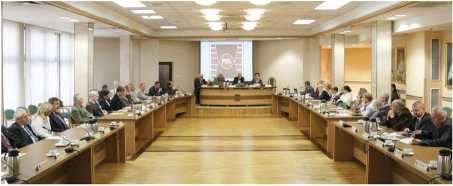1531834170
Władze Uczelni University Authorities
Uczelnią kieruje rektor jako jednoosobowy organ władzy wykonawczej, będący jednocześnie przełożonym wszystkich pracowników i studentów. Rektorowi pomagają w sprawowaniu władzy prorektorzy: ds. Rozwoju Kadry i Badań Naukowych, ds. Innowacyjnej Gospodarki i Współpracy z Przemysłem, ds. Ogólnych, ds. Studenckich i Dydaktyki oraz kanclerz. Odpowiednikami rektora i prorektorów na wydziałach są dziekan i prodziekani. Dziekan jest przełożonym pracowników i studentów wydziału.
Organami kolegialnymi są Senat w odniesieniu do Uczelni oraz Rada Wydziału w stosunku do Wydziału. W skład Senatu wchodzą: rektor jako przewodniczący, prorektorzy, dziekani oraz wybierani przedstawiciele poszczególnych grup społeczności uczelnianej. Członkami Rady Wydziału są: dziekan jako przewodniczący, prodziekani, zatrudnieni na wydziale profesorowie i doktorzy habilitowani oraz wybrani przedstawiciele pozostałych grup społeczności wydziałowej.
Organy kolegialne sprawują władzę przez podejmowanie uchwał w węzłowych sprawach dotyczących uczelni i wydziału oraz przez działalność tematycznych komisji i zespołów wyłanianych ze swoich składów.
The Kielce University of Technology is headed by the Rector, who is a single-person executive body, superior to all the staff and students. The Rector is assisted by the Vice-Rector for Staff Development and Research, the Vice-Rector for lnnovative Economy and Cooperation with Industry, the Vice-Rector for General Affairs, the Vice Rector for Education and Students, and the Chancellor. By analogy, each faculty is headed by a dean, who is in charge of all the staff and students within the faculty. The dean is supported in this role by vice-deans.
The governing councils at the university- and faculty-levels are the Senate and the Faculty Boards, respectively. The Senate comprises the Rector, acting as the chairperson, the Vice-Rectors, the Deans, and elected representatives of the University community. Each Faculty Board consists of the Dean, acting as the chairperson, the Vice-Deans, the staff members holding the academic title of professor and the degree of habilitated doctor, and elected representatives of the Faculty community.
The governing councils control and direct the affairs of the University or Faculty by passing appropriate resolutions on issues of the utmost importance or by dealing with these issues thematically in dedicated committees and groups.

Sala posiedzeń Senatu Senate Meeting Room
7
Wyszukiwarka
Podobne podstrony:
Władze Uczelni Uczelnią kieruje rektor jako jednoosobowy organ władzy wykonawczej, będący jednocześn
Władze Uczelni Komendant- Rektor AMW kontradmirał prof. dr hab. inż. Zygmunt KITOWSKI Zastępca
WŁADZE UCZELNI Najwyższym organem kolegialnym Uczelni jest Senat. W skład Senatu wchodzą: rektor jak
WŁADZE UCZELNI Najwyższym organem kolegialnym Uczelni jest Senat. W skład Senatu wchodzą: rektor jak
WŁADZE UCZELNI Najwyższym organem kolegialnym Uczelni jest Senat. W skład Senatu wchodzą: rektor jak
2. WŁADZE UCZELNI Rektor kieruje działalnością naukowo - dydaktyczną Uczelni i reprezentuje ją na
WŁADZE UCZELNI Najwyższym organem kolegialnym Uczelni jest Senat. W skład Senatu wchodzą: rektor jak
WŁADZE UCZELNI i I WYDZIAŁU LEKARSKIEGO W ROKU AKADEMICKIM 2010/11 Rektor Prorektorzy -
1. WŁADZE UCZELNI Rektor Prof. dr hab. Stanisław ULIASZ Prorektorzy
WŁADZE UCZELNI i WYDZIAŁU LEKARSKO-DENTYSTYCZNEGO w roku akademickim 2013/2014 Rektor - Prof. dr hab
WŁADZE UCZELNI i I WYDZIAŁU LEKARSKIEGO W ROKU AKADEMICKIM 2007/2008 Rektor - prof
WŁADZE UCZELNIi I WYDZIAŁU LEKARSKIEGO W ROKU AKADEMICKIM 2012/2013 Rektor - Prof. dr hab. n. med. M
WŁADZE UCZELNI i I WYDZIAŁU LEKARSKIEGO W ROKU AKADEMICKIM 2010/11 Rektor prof. dr hab. Marek
Władze uczelni: • Rektor - prof. dr hab. Michał Mazurkiewicz •
WŁADZE UCZELNI i I WYDZIAŁU LEKARSKIEGO W ROKU AKADEMICKIM 2010/2011 Rektor - prof. dr hab. MAREK
Władze uczelni Rektor-Komendant gen. bryg. prof. dr hab. inż. Zygmunt MIERCZYK Prorektor ds. wojskow
WŁADZE UCZELNI i I WYDZIAŁU LEKARSKIEGO W ROKU AKADEMICKIM 2009/10 Rektor Prorektorzy -
Władze Uczelni Jego Magnificencja Rektor prof. dr hab. inż. Tadeusz Więckowski Prorektor ds.
WŁADZE UCZELNI i I WYDZIAŁU LEKARSKIEGO W ROKU AKADEMICKIM 2009/10 Rektor Prorektorzy -
więcej podobnych podstron